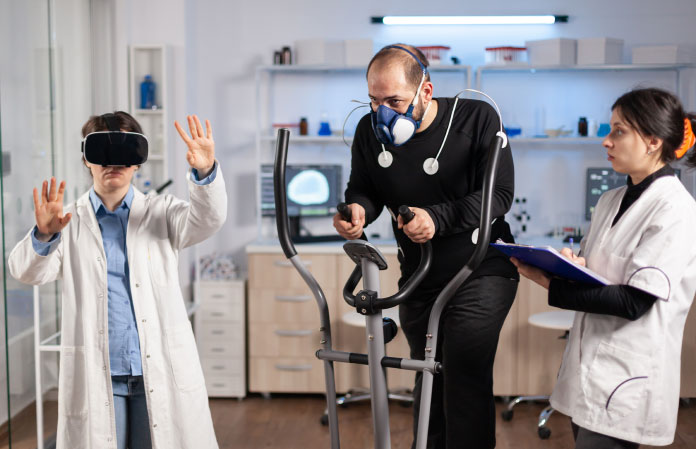The US health tech startup ecosystem is going through a significant transformation, driven by advanced AI, telehealth, and patient-centric innovation. In 2025, these companies are impacting every aspect of medicine and care, from at-home diagnostics to AI-driven treatment plans, making healthcare more accessible and efficient.
Post pandemic healthcare system is different, and the adoption of telehealth startups has skyrocketed. The investment in this sector is surging, which is accelerating growth in healthcare startups. Medical companies are now shifting towards reducing costs, improving accuracy, and discovering new medical technologies that improve patient engagement.
The article is going to spotlight the top 10 health tech startups in 2025. Whether you are an investor, healthcare professional, or tech enthusiast, you learn how these health technology startups influence the US. Healthcare and the entire world.
Top 10 US Healthtech Startups To Watch In 2025
Medical technology companies worldwide are securing more investment to make healthcare personalized and accessible to all. Among them, US health technology start-ups are leading and offering innovative care to patients. The fastest-growing health tech companies in the US are listed below.
Founded: 2013
Location: San Francisco, CA
Founders: Erik Engelson and David Steinmiller
Funding: $117M
Lucira Health is an FDA-authorized at-home molecular testing company, which includes COVID-19 and other flu kits. The single-use PCR delivers lab-accurate results in 30 minutes, which avoids clinic visits, and is fit for common infections. As part of its plan, the company is moving to chronic disease monitoring tests for diabetes and cardiovascular health markers.
Founded: 2020
Location: Burlington, MA
Founders: Michael Dubrovsky and Diedrik Vermeulen
Funding: $10M
This health tech startup uses silicon photonics to miniaturize blood testing into a handheld device. The testing is simple because you need to finger prick a sample that measures 20+ biomarkers (from vitamin D to CRP). Its partnership with wellness clinics is making the testing a more affordable subscription-based model.
Founded: 2017
Location: Cambridge, MA
Founders: Mariana Matus and Newsha Ghaeli
Funding: $20M
Biobot AI in healthcare can analyze wastewater to track pathogens, drugs, and nutrition trends. The AI models help cities predict COVID-19 surges weeks before clinical cases spike. The recent projects from BIobot include monitoring antibiotic resistance and opioid use patterns for public health agencies.
Curious about how AI is helping healthcare? Read: AI in Healthcare is Reshaping the Realm & Transforming Lives
Founded: 2021
Location: New York, NY
Founders: Dr. Joshua Tamayo-Sarver
Funding: $5M
It is an AI that cross-references symptoms with global case databases to suggest diagnoses. The system learns from each past, reducing rare disease misdiagnoses by 40% in trials. Hospitals in the United States use it to augment the ER triage and specialist consultations.
Founded: 2019
Location: Toronto, Canada (US operations in Boston)
Founders: Dr. Ryan D’Arcy and Dr. Alexander Rau
Funding: $8M
BrainKey is one of the health tech startups that includes AI to detect subtle anomalies in brain scans and provide early intervention. Its FDA-cleared software is unique and tracks the recovery progress. Their platform also assists radiologists with automated report generation and saves their time.
Founded: 2018
Location: Chicago, IL
Founders: Dr. John Halamka and Paul Cerrato
Funding: $15M
Mednet’s blockchain network encrypts and shares EHRs across institutions without centralized servers. It is better to streamline clinical trial recruitment while preserving anonymity. Many companies utilize their de-identified data for drug development and insights.
Founded: 2012
Location: San Francisco, CA
Founders: Vineet Singal and Gopal Chopra
Funding: $25M
CareMessage is one of the top health tech companies that provides a multilingual SMS platform for its users. The platform can also send personalized health reminders to Medicaid patients. Clinics are now using their system to see 50% higher medication adherence rates. They also provide AI chatbots for diabetes management and postpartum care check-ins.
Founded: 2014
Location: San Francisco, CA
Founders: Noga Leviner and Troy Astorino
Funding: $60M
Organizing medical records into a visual timeline is the purpose of PicnicHealth. Its records are helpful as they provide patients with a treatment history, like a timeline. Many researchers use their de-identified datasets for studying long COVID and autoimmune diseases.
Founded: 2020
Location: San Francisco, CA
Founders: Lucia Huang and Jimmy Qian
Funding: $40M
Osmind specializes in psychedelic-assisted therapy and treatment-resistant depression. Clinicians use Osmind’s analytics to compare outcomes across ketamine, TMS, and other interventions. The platform is also useful for connecting patients to cutting-edge clinical trials for mental health breakthroughs.
Founded: 2019
Location: Austin, TX
Founders: Dr. Sarah Werner and Mark Reynolds
Funding: $12M
VetRec is a pet healthcare company that uses a cloud-based system to replace paper records with AI technology in healthcare. Several pet owners use their telehealth feature for video consults for post-op care or nutrition advice. The platform integrates with pet insurance providers and wearable devices, such as FitBark for better care.
Conclusion
Health tech startups in the United States highlight that care is moving forward to offer personalized and fast solutions to patients. For this, these patient engagement platforms use AI-powered diagnostics and decentralized patient records. These companies are not improving efficiency but ensuring easy access, cutting costs, and saving lives through medical technology.
Tracking these digital healthcare startups is vital as they are shaping the future of medicine today. The AI in healthcare and at-home testing is evolving, and this technology is making high-quality care affordable and personalized for everyone. These health tech startups are making everything accessible and caring for a better life in the future.




